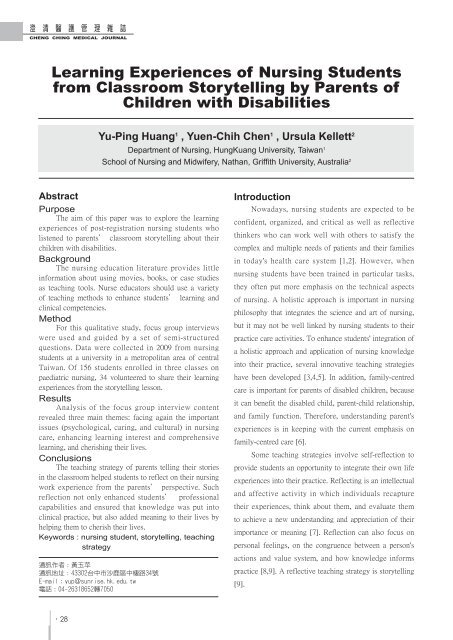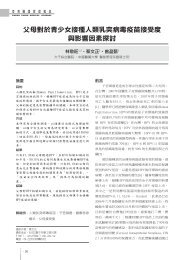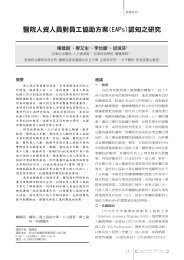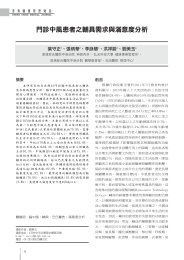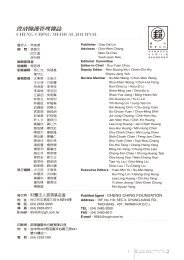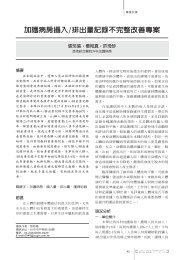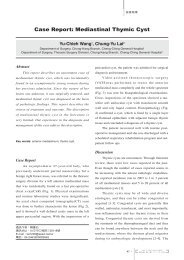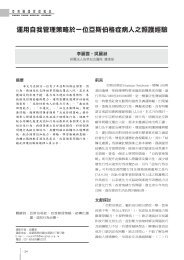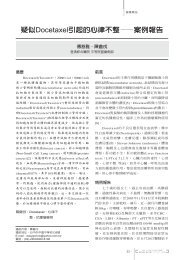Learning Experiences of Nursing Students from Classroom ...
Learning Experiences of Nursing Students from Classroom ...
Learning Experiences of Nursing Students from Classroom ...
You also want an ePaper? Increase the reach of your titles
YUMPU automatically turns print PDFs into web optimized ePapers that Google loves.
澄 清 醫 護 管 理 雜 誌<br />
CHENG CHING MEDICAL JOURNAL<br />
<strong>Learning</strong> <strong>Experiences</strong> <strong>of</strong> <strong>Nursing</strong> <strong>Students</strong><br />
<strong>from</strong> <strong>Classroom</strong> Storytelling by Parents <strong>of</strong><br />
Children with Disabilities<br />
Yu-Ping Huang 1 , Yuen-Chih Chen 1 , Ursula Kellett 2<br />
Department <strong>of</strong> <strong>Nursing</strong>, HungKuang University, Taiwan 1<br />
School <strong>of</strong> <strong>Nursing</strong> and Midwifery, Nathan, Griffith University, Australia 2<br />
Abstract<br />
Purpose<br />
The aim <strong>of</strong> this paper was to explore the learning<br />
experiences <strong>of</strong> post-registration nursing students who<br />
listened to parents’ classroom storytelling about their<br />
children with disabilities.<br />
Background<br />
The nursing education literature provides little<br />
information about using movies, books, or case studies<br />
as teaching tools. Nurse educators should use a variety<br />
<strong>of</strong> teaching methods to enhance students’ learning and<br />
clinical competencies.<br />
Method<br />
For this qualitative study, focus group interviews<br />
were used and guided by a set <strong>of</strong> semi-structured<br />
questions. Data were collected in 2009 <strong>from</strong> nursing<br />
students at a university in a metropolitan area <strong>of</strong> central<br />
Taiwan. Of 156 students enrolled in three classes on<br />
paediatric nursing, 34 volunteered to share their learning<br />
experiences <strong>from</strong> the storytelling lesson.<br />
Results<br />
Analysis <strong>of</strong> the focus group interview content<br />
revealed three main themes: facing again the important<br />
issues (psychological, caring, and cultural) in nursing<br />
care, enhancing learning interest and comprehensive<br />
learning, and cherishing their lives.<br />
Conclusions<br />
The teaching strategy <strong>of</strong> parents telling their stories<br />
in the classroom helped students to reflect on their nursing<br />
work experience <strong>from</strong> the parents’ perspective. Such<br />
reflection not only enhanced students’ pr<strong>of</strong>essional<br />
capabilities and ensured that knowledge was put into<br />
clinical practice, but also added meaning to their lives by<br />
helping them to cherish their lives.<br />
Keywords : nursing student, storytelling, teaching<br />
strategy<br />
通 訊 作 者 : 黃 玉 苹<br />
通 訊 地 址 :43302 台 中 市 沙 鹿 區 中 棲 路 34 號<br />
E-mail:yup@sunrise.hk.edu.tw<br />
電 話 :04-26318652 轉 7050<br />
Introduction<br />
Nowadays, nursing students are expected to be<br />
confident, organized, and critical as well as reflective<br />
thinkers who can work well with others to satisfy the<br />
complex and multiple needs <strong>of</strong> patients and their families<br />
in today's health care system [1,2]. However, when<br />
nursing students have been trained in particular tasks,<br />
they <strong>of</strong>ten put more emphasis on the technical aspects<br />
<strong>of</strong> nursing. A holistic approach is important in nursing<br />
philosophy that integrates the science and art <strong>of</strong> nursing,<br />
but it may not be well linked by nursing students to their<br />
practice care activities. To enhance students' integration <strong>of</strong><br />
a holistic approach and application <strong>of</strong> nursing knowledge<br />
into their practice, several innovative teaching strategies<br />
have been developed [3,4,5]. In addition, family-centred<br />
care is important for parents <strong>of</strong> disabled children, because<br />
it can benefit the disabled child, parent-child relationship,<br />
and family function. Therefore, understanding parent's<br />
experiences is in keeping with the current emphasis on<br />
family-centred care [6].<br />
Some teaching strategies involve self-reflection to<br />
provide students an opportunity to integrate their own life<br />
experiences into their practice. Reflecting is an intellectual<br />
and affective activity in which individuals recapture<br />
their experiences, think about them, and evaluate them<br />
to achieve a new understanding and appreciation <strong>of</strong> their<br />
importance or meaning [7]. Reflection can also focus on<br />
personal feelings, on the congruence between a person's<br />
actions and value system, and how knowledge informs<br />
practice [8,9]. A reflective teaching strategy is storytelling<br />
[9].<br />
.28
原 著 研 究<br />
The art or aesthetics <strong>of</strong> nursing refers to<br />
understanding the subjective experience <strong>of</strong> patients and<br />
the meaning behind their behaviour; to develop this<br />
understanding, students need to develop empathy for<br />
patients by listening to their stories [5]. At the same<br />
time, patients' storytelling will also help students learn<br />
about the science <strong>of</strong> nursing in terms <strong>of</strong> medical events,<br />
diagnostic processes, and medical complications. Thus,<br />
years), with an average <strong>of</strong> 11.5 years work experience<br />
(range=1 to 26 years). Their paediatric training included<br />
a 2-hour lecture in which parents were invited to tell their<br />
stories. Of 156 students in three storytelling classes, 34<br />
volunteered to share their learning experience in focus<br />
groups. They were on average 33 years old (range=23 to<br />
42 years), with an average <strong>of</strong> 7 years work experience<br />
(range=2 to 17 years).<br />
students combine the art <strong>of</strong> understanding patients’<br />
experience with the science <strong>of</strong> learning about their illness,<br />
thus seeing patients as whole persons. Storytelling helps<br />
students to think beyond the empirical by allowing them<br />
to meaningfully link their personal experiences with<br />
classroom learning [5]. Storytelling not only strengthens<br />
traditional teaching methods in terms <strong>of</strong> lectures and<br />
clinical practice, but also helps students apply class<br />
learning to clinical learning [10,11]. However, in most<br />
research on storytelling, students tell their own stories<br />
[9,12] or read novels [2,10], but do not learn <strong>from</strong><br />
storytelling <strong>from</strong> patient's or family's perspective [3].<br />
Data collection<br />
Data were collected <strong>from</strong> April to December 2009<br />
in focus group interviews guided by semi-structured<br />
questions. For example, ‘What are your feelings and<br />
thoughts about this class?’ This question was followed<br />
by specific questions related to the research purpose<br />
[13]. For example, ‘How has the parent's story affected<br />
your practice as a nurse?’ Focus groups were held 1<br />
week after the storytelling class. After the class, students<br />
received a flyer about the study. Interested students<br />
could phone a research assistant (RA) to indicate their<br />
willingness to participate. Six focus groups were formed,<br />
The Study<br />
Aim<br />
The purpose <strong>of</strong> this study was to explore nursing<br />
students' learning experience after classroom storytelling<br />
by parents <strong>of</strong> children with disabilities.<br />
Design<br />
A focus group design was used to obtain students'<br />
learning experiences with the teaching method <strong>of</strong> parents'<br />
storytelling. Focus group interviews were chosen to help<br />
gain rich information through group interaction about<br />
students' opinions, feelings, and attitudes towards parents<br />
telling their stories in the classroom [13].<br />
with 5-6 students each and two focus groups <strong>from</strong> each<br />
class. The first author acted as the interviewer. She<br />
has been trained as a qualitative researcher when she<br />
studied in her doctoral degree and she performed several<br />
qualitative studies as well. Also she has been prolonged<br />
engagement in the field <strong>of</strong> children with disability.<br />
Interviews lasted <strong>from</strong> 50 to 90 minutes. All interviews<br />
were tape recorded. After six focus group interviews,<br />
the interview data reached saturation in terms <strong>of</strong> no new<br />
information emerging <strong>from</strong> analysis and interviewing was<br />
stopped [13]. The interview setting was in a university<br />
conference room.<br />
Participants<br />
The participants were recruited <strong>from</strong> 156 part-time,<br />
post-registration nursing students in their second year <strong>of</strong><br />
a 2-year baccalaureate degree program at a university in<br />
central Taiwan. <strong>Students</strong> worked full time as registered<br />
nurses and attended classes at the university 1 day a week.<br />
<strong>Students</strong> were on average 31 years old (range=23 to 51<br />
Selecting parents<br />
A key element to the success <strong>of</strong> parents' storytelling<br />
as a teaching strategy is selecting suitable parents [3].<br />
In selecting parents, the first author fully informed them<br />
about the storytelling and considered several factors:<br />
the parents' willingness to and comfort in telling their<br />
personal stories to a classroom <strong>of</strong> students and the first<br />
29.<br />
Vol. 8 No.2 APR 2012<br />
第 八 卷 第 二 期 二 ○ 一 二 四 月
澄 清 醫 護 管 理 雜 誌<br />
CHENG CHING MEDICAL JOURNAL<br />
author knew the parents' stories well and had a good<br />
relationship with them. Three parents were contacted<br />
by the first author and explained the proposed teaching<br />
plan and the reasons for asking them to tell their stories<br />
to students. They were happy to share their experiences,<br />
were informed <strong>of</strong> their right to withdraw <strong>from</strong> the study at<br />
any time and that their confidentiality would be protected.<br />
After students were informed, they signed informed<br />
consent. Parents who told their stories in class also signed<br />
informed consent before the class.<br />
because they felt that it might help improve the students'<br />
understanding and the quality <strong>of</strong> care provided to other<br />
children and families in the future. In order to let students<br />
understand the lived experience <strong>of</strong> parents <strong>of</strong> disabled<br />
children, the inclusion criteria for parents were parents<br />
having a disabled child at home, Chinese as parent's first<br />
language who were willing to share their stories.<br />
Data analysis and rigour<br />
All interviews were transcribed verbatim. The<br />
transcripts and field notes were analyzed by thematic<br />
analysis. First, the first author read through all the<br />
transcripts to gain a general understanding <strong>of</strong> students'<br />
experiences. Next, transcripts were coded and labelled<br />
line-by-line to highlight the significant parts related to<br />
Student preparation for parent storytelling<br />
<strong>Students</strong> in the three classes were prepared for<br />
parent storytelling in two ways. First, they received a<br />
1-hour lecture with a general outline on care <strong>of</strong> children<br />
with disabilities before the parent-in-the-classroom class.<br />
Second, before the class started, the lecturer explained in<br />
detail how the class would proceed. The process for each<br />
class was the same, even though a different parent told<br />
each class his/her story about the caring experience. That<br />
is, one class listened to a mother <strong>of</strong> a child with cerebral<br />
palsy (CP), another class listened to the mother <strong>of</strong> a child<br />
student's learning experience with storytelling. Finally,<br />
codes were integrated into core categories, which were<br />
then organized into major themes, or broad and specific<br />
themes [14]. Trustworthiness <strong>of</strong> the study was enhanced<br />
by inviting an expert in qualitative research to validate the<br />
findings and by member checks, giving participants an<br />
opportunity to comment on the developing interpretation<br />
<strong>of</strong> their experience, by providing a detailed description <strong>of</strong><br />
the process and context <strong>of</strong> the research in great detail, and<br />
by showing how the data were gathered and analyzed to<br />
keep an audit or decision trail [15].<br />
with encephalopathy and CP, and the other class listened<br />
to the father <strong>of</strong> a child with Joubert syndrome. <strong>Students</strong><br />
were allowed to ask questions and share their thoughts<br />
during class. The students were also told that the teacher<br />
would ask them questions to link the parent's experience<br />
with their nursing knowledge and their own clinical<br />
practice.<br />
Results<br />
Analysis <strong>of</strong> the focus group interview data led to<br />
three main themes regarding students’ experiences:<br />
re-facing the important issues <strong>of</strong> nursing care, enhancing<br />
learning interest and comprehensive learning, and<br />
cherishing their lives.<br />
Ethical considerations<br />
Before data collection, the study was approved by<br />
the hospital institutional review board, which examines<br />
ethical applications <strong>from</strong> both the university and hospital.<br />
The flyer given to students about the study explained its<br />
purpose, research process, potential risks and benefits.<br />
Importantly, students were told that participation in the<br />
study would not be related to their grade in the paediatric<br />
nursing course. Before focus group interviews, students<br />
Re-facing the important issues <strong>of</strong><br />
nursing care<br />
The parents shared their experiences in caring<br />
for their disabled child <strong>from</strong> finding something wrong<br />
with the child to the present day. These experiences<br />
covered interactions among the parents, disabled child,<br />
family members, and health care pr<strong>of</strong>essionals. Thus, the<br />
parents’ stories prompted students to examine their own<br />
clinical performance in terms <strong>of</strong> three important issues:<br />
.30
原 著 研 究<br />
psychology, caring, and culture.<br />
The importance <strong>of</strong> approaching psychological<br />
issues<br />
The parents experienced fear, helplessness,<br />
powerlessness, difficulties or ambiguity when they talked<br />
about the process interaction with the health system.<br />
Such sharing gave the students valuable insights into the<br />
parents' inner world, leading students to feel that they<br />
didn't do enough for these parents in terms <strong>of</strong> dealing with<br />
their psychological issues.<br />
We knew that parents feel sorrow when raising<br />
a disabled child. They need help <strong>from</strong> us. … We<br />
just didn't know how to talk to them, so we just<br />
ignored them on purpose. Sometimes we were<br />
busy with clinical routines and technical work,<br />
so we didn't initiate talking to these parents about<br />
their feelings and thoughts even though we saw<br />
their worried and sad expressions. (Group 4)<br />
Dealing with psychological issues <strong>of</strong> patients or<br />
families makes them feel uncomfortable. They also do not<br />
have much experience in managing this issue, so they lack<br />
confidence to face this critical issue.<br />
I am a nurse so I should be able to handle my<br />
job well, so I would like to finish my duties<br />
on time, such as giving medicine to patients or<br />
teaching them how to care for themselves. But<br />
a psychological problem was an aspect I didn't<br />
want to touch. I didn't know how to handle<br />
it well. After hearing parent's story, I need to<br />
change the ways I work to care for patient's or<br />
family's psychological aspect. (Group 6)<br />
The importance <strong>of</strong> caring with heart<br />
The students acknowledged the importance <strong>of</strong><br />
compassion and caring when carrying out all nursing<br />
activities. The students did not have much time to find<br />
out how patients and families felt about the care they<br />
had received at the hospital due to busy doing clinical<br />
routines and paper work. The students realized that their<br />
patients' needs might have been ignored due to their lack<br />
<strong>of</strong> sensitivity and not looking at things <strong>from</strong> the patients'<br />
perspective.<br />
When a child is hospitalized, the parents don't<br />
take any action or say anything if they feel that<br />
we [nurses] didn't take good care <strong>of</strong> their child,<br />
but only accept whatever we do. However, they<br />
might have felt upset and sad when they went<br />
home. … Mostly, we know their reactions to our<br />
services by asking them to fill out 5 close-ended<br />
questions before their discharge. … I now think<br />
that we should ask them [patients and families]<br />
how they feel and think about our nursing care.<br />
(Group 1)<br />
<strong>Nursing</strong> students appreciate that nurses are the key<br />
persons to help parents and their families overcome their<br />
negative emotions and difficulties. Thus, having a work<br />
attitude filled with caring, empathy, and support was vital<br />
since such a warm and caring medical environment can<br />
benefit patients and family members.<br />
After this class, I have changed my work attitude.<br />
Now, when a family comes to visit their child at<br />
the hospital, I give them positive feedback and<br />
support. They react really different. The parents<br />
have been coming to massage their child every<br />
day. The child has been lying in bed for half a<br />
year. This time I told them, ‘You are great.<br />
You massage him every day and talk to him'<br />
… Usually, we only tell the parents about the<br />
child's heart rate, blood pressure and whether the<br />
temperature is normal or not. That's all, and then<br />
we walk away and go care for other patients.<br />
(Group 1)<br />
The importance <strong>of</strong> cultural issues in the health<br />
care system<br />
<strong>Students</strong> learned how a family support system is<br />
vital to parents when raising a disabled child at home in a<br />
traditional Chinese culture, because support <strong>from</strong> parentsin-law<br />
and other family members can ease the parents'<br />
stresses and reduce feelings <strong>of</strong> marginalisation. Thus,<br />
students were willing to make a commitment to involve<br />
family members in children's care.<br />
I can understand how hard it was for the mother<br />
to deal with her feelings when her parents-in-<br />
31.<br />
Vol. 8 No.2 APR 2012<br />
第 八 卷 第 二 期 二 ○ 一 二 四 月
澄 清 醫 護 管 理 雜 誌<br />
CHENG CHING MEDICAL JOURNAL<br />
law rejected her disabled child, because I also<br />
have a difficult relationship with my parents-inlaw,<br />
even though my child is healthy. Thus we<br />
[nurses] should include family members in the<br />
nursing care plan to allow them to understand<br />
and be involved in caring for the disabled child,<br />
especially in the Taiwanese context. (Group 6)<br />
To ensure that family members were involved<br />
in the medical care team, students thought that<br />
they should act as advocates and negotiators for<br />
the family so that better medical decisions could<br />
be made. One student said, ‘Nurses should act<br />
as negotiators on the medical team, so that the<br />
care plan will meet the needs <strong>of</strong> both patients and<br />
families.’ (Group 2)<br />
Enhancing learning interest and<br />
comprehensive learning<br />
This learning experience was the first time students<br />
had experienced parents coming to the classroom to<br />
directly share their experiences. The first-hand story<br />
not only captured the students' attention and interest,<br />
but also helped them understand disabled children and<br />
their parents in terms <strong>of</strong> improving their comprehensive<br />
learning. As one student stated,<br />
Usually, we sit in the classroom and listen to<br />
the teacher talk to us <strong>from</strong> the podium. Some<br />
students will doze <strong>of</strong>f during class. But that does<br />
not happen in a class like this, because it piques<br />
our interest, and we pay attention and think about<br />
the mother's story and teacher's questions and<br />
classmates' sharing. … From this lesson, I learned<br />
more about cerebral palsy and mother's stresses<br />
and coping strategies. (Group 1)<br />
Having an opportunity to listen to the parents' stories<br />
allowed students to experience the meaning and impact<br />
<strong>of</strong> parenting a disabled child. The students realized that<br />
parents' stories could help them fill a clinical nursing gap<br />
and increase their sensitivity to the needs <strong>of</strong> their patients<br />
and families. One student said,<br />
Actually we don't have too much time to read<br />
our textbooks as we are both students and fulltime<br />
nurses. This teaching method allows us to<br />
think more about our clinical work. … Although<br />
we have dealt with patients and their families as<br />
nurses, we have never had an opportunity to listen<br />
to their stories. I felt this lesson was valuable.<br />
… I didn't need to spend time to remember<br />
the important issues that I learned in this class,<br />
because I already absorbed it by listening to the<br />
mothers' stories. (Group 4)<br />
Cherishing their lives<br />
<strong>Students</strong> were deeply moved by the parents' stories.<br />
They were amazed by all the attention, love, and patience<br />
parents gave to the care <strong>of</strong> their disabled child, regardless<br />
<strong>of</strong> the child's disability. <strong>Students</strong> reflected on what they<br />
had taken for granted in their lives. This reflection made<br />
them feel deep contentment and appreciation for what<br />
they had in their lives.<br />
I talked about what I heard <strong>from</strong> class with my<br />
husband and my child. ... My husband said,<br />
‘We always complained about our lives, but we<br />
are fortunate to have a healthy child.’ So we<br />
can work on the goals and dreams that we already<br />
planned. I should learn to appreciate my life<br />
more. (Group 3)<br />
The students taught their children how to face<br />
their disabled classmates and to help them. The students<br />
believed these teachings would not only contribute to a<br />
better environment and acceptance <strong>of</strong> disabled children in<br />
society, but help their children become better people, with<br />
more empathy and caring.<br />
I know there is a child with Down syndrome<br />
in my child’s classroom. I told my child that<br />
he should treat his disabled classmate as a<br />
normal child and play with him normally. Most<br />
importantly, he should actively <strong>of</strong>fer help to him.<br />
We should not discriminate against them. I should<br />
encourage my child to have a positive attitude<br />
toward disabled children. (Group 2)<br />
Discussion<br />
When parents <strong>of</strong> disabled children told their<br />
.32
原 著 研 究<br />
stories in the classroom, it was filled with energy and<br />
every student was totally concentrated on the parents<br />
and listened to their stories. This type <strong>of</strong> class provides<br />
multiple interactions among parents, students, and teacher.<br />
<strong>Students</strong> learn not only <strong>from</strong> the parents, but also <strong>from</strong><br />
the teacher and other students. Davidson (2004) stated<br />
that using storytelling as a teaching method promoted<br />
participatory learning in the class by encouraging students<br />
to actively listen, express their opinions, participate,<br />
and discuss the stories [16]. Content <strong>from</strong> storytelling is<br />
much easier to remember than <strong>from</strong> textbooks because<br />
it provides concrete information and vivid images for<br />
listeners [10]. Our findings are consistent with those<br />
<strong>of</strong> previous reports <strong>of</strong> classroom storytelling. In these<br />
studies, students' listening to stories encouraged them<br />
to look at things <strong>from</strong> a different perspective, to try and<br />
see the whole picture, to work out the problem, to think<br />
about the consequences, and to develop reasoning and<br />
critical thinking ability [1,6]. Thus, listening to a parent's<br />
story provided students with an opportunity to reflect on<br />
their personal clinical performance and on their reactions<br />
to possible scenarios in the future, allowing them to<br />
incorporate other possible approaches [2,16]. Thus nurses<br />
should not only open up to listening to their patients'<br />
stories, but also show their willingness and make time to<br />
listen to their stories by being with them, even under busy<br />
working conditions [17].<br />
<strong>Students</strong> in our study pointed out their weakness<br />
in being afraid to approach psychological issues, but<br />
they started to realize the importance <strong>of</strong> such issues after<br />
hearing the parents' stories. This appreciation <strong>of</strong> the<br />
patient's wholeness in terms <strong>of</strong> physical, psychological<br />
and spiritual aspects has been reported as a crucial<br />
team to help parents <strong>of</strong> disabled children successfully<br />
cope with difficulties in managing the child's care.<br />
Similarly, cultural sensitivity was found to be fostered by<br />
storytelling [10,17]. <strong>Students</strong> in the present study showed<br />
that they understood the importance <strong>of</strong> compassion and<br />
caring, listening, empathy, <strong>of</strong> keeping an open mind, and<br />
<strong>of</strong> looking at things <strong>from</strong> another person's perspective.<br />
Listening to parents' stories helped students understand<br />
how patients and their families felt and motivated students<br />
to respond to their patients and their families and to help<br />
them more [1,5].<br />
Listening to the parents' stories helped the students<br />
in our study learn real knowledge <strong>from</strong> real stories [19].<br />
After listening to parents' stories, students in the present<br />
study cherished their lives. This finding is supported by<br />
a previous report that stories about children with illness<br />
or disability helped students to appreciate their lives<br />
more and to view hope as important coping strategy in<br />
overcoming life’s difficulties [2]. Stories related to<br />
class content also add meaning to students’ learning by<br />
helping them become aware <strong>of</strong> what is valuable for them<br />
[11].<br />
Conclusion<br />
The teaching strategy <strong>of</strong> parents sharing stories<br />
about their disabled child in the classroom helped<br />
students to reflect on their nursing work experience <strong>from</strong><br />
the parents’ perspective. Such reflection enhances<br />
students’ pr<strong>of</strong>essional capabilities and ensures that<br />
knowledge is put into clinical practice. Therefore, nurse<br />
educators should invite patients or family members to tell<br />
their stories in the classroom, thus facilitating students’<br />
ability to learn and reflect as well as to link theory with<br />
practice.<br />
reason for using storytelling in clinical teaching for<br />
nurses [17,18]. Listening to parents' stories has been<br />
found to help nursing students become more empathetic<br />
pr<strong>of</strong>essionals due to increased awareness and sensitivity<br />
to the emotional needs <strong>of</strong> families with sick children [3].<br />
<strong>Students</strong> also realized the importance <strong>of</strong> cultural issues<br />
when having a child with disability in a family, so they<br />
were willing to involve family members in the medical<br />
Limitations and Suggestions<br />
This study contributes a valuable teaching method<br />
for nurse educators, but it had some limitations. First,<br />
the sample included only part-time, post-registration<br />
nursing students, so future research should include nursing<br />
students without working experience. Second, the size <strong>of</strong><br />
the three classes was 50-52 students, which may be too<br />
33.<br />
Vol. 8 No.2 APR 2012<br />
第 八 卷 第 二 期 二 ○ 一 二 四 月
澄 清 醫 護 管 理 雜 誌<br />
CHENG CHING MEDICAL JOURNAL<br />
big for storytelling lessons because it reduced the chance<br />
<strong>of</strong> interactions among parents and all students. There are<br />
two suggestions for classroom storytelling in the future.<br />
<strong>Students</strong> should be provided 1- or 2-hour discussion after<br />
class in order to recap and re-organize the information<br />
covered in the parents’ stories. The classroom venue<br />
should be a suitable place such as a conference room that<br />
allows the students to form a semi-circle around the parent<br />
and so provide a better environment for interactions.<br />
References<br />
1.Dickieson P, Carter LM, Walsh M: Integrative thinking<br />
and learning in undergraduate nursing education: three<br />
strategies. Int J Nurs Educ Scholarsh 2008;5(1):1-15.<br />
2.Northington L, Wilkerson R, Fisher W, et al: Enhancing<br />
nursing students' clinical experiences using aesthetics. J<br />
Pr<strong>of</strong> Nurs 2005;21(1):66-71.<br />
3.Price J: A parent in the classroom-a valuable way<br />
<strong>of</strong> fostering deep learning for the children's nursing<br />
student. Nurs Educ Pract 2004; 4: 5-11.<br />
4.Corkin D, Clarke S: Children's nursing education: ‘the<br />
future characterised by paradoxes’. Paediatr Nurs<br />
2007; 9(8):27-30.<br />
5.Hunter LA: Stories as integrated patterns <strong>of</strong> knowing in<br />
nursing education. Int J Nurs Educ Scholarsh<br />
2008;5(1):1-13.<br />
6.Dempsey I, Keen D, Pennell D, et al: Parent stress,<br />
11.Stein D: Storytelling: an adjunct to learning. J Contin<br />
Educ Nurs 2009;40(7): 296-7.<br />
12.Lordly D: Once upon a time. Storytelling to<br />
enhance teaching and learning. Can J Diet Pract Res<br />
2007;68(1): 30-5.<br />
13.Halcomb EJ, Gholizadeh L, DiGiacomo M, et al:<br />
Literature review: considerations in undertaking focus<br />
group research with culturally and linguistically diverse<br />
group. J Clin Nurs 2007;16:1000-11.<br />
14.Ezzy D: Coding data and interpreting text: methods <strong>of</strong><br />
analysis. In: Qualitative Analysis: Practice and<br />
Innovation. London, Routledge, 2002: 80-109.<br />
15.Lincoln YS, Guba EG: Establishing trustworthiness.<br />
In: Naturalistic Inquiry. Newbury Park, Sage<br />
Publications, 1985: 289-331.<br />
16.Davidson MR: A phenomenological evaluation: using<br />
storytelling as a primary teaching method. Nurse Educ<br />
Pract 2004; 4:184-9.<br />
17.Nicholl HM, Tracey CAB: Questioning: a tool in the<br />
nurse educator's kit. Nurse Educ Pract 2007; 7:285-92.<br />
18.Schwartz M, Abbott A: Storytelling: a clinical<br />
application for undergraduate nursing students. Nurse<br />
Educ Pract 2007;7:181-6.<br />
19.Mitchell M, Hall J: Teaching spirituality to student<br />
midwives: a creative approach. Nurse Educ Pract<br />
2007;7:416-24.<br />
parenting competence and family-centered support to<br />
young children with an intellectual or developmental<br />
disability. Res Dev Disabil 2009; 30:558-66.<br />
7.Chirema KD: The use <strong>of</strong> reflective journals in the<br />
promotion <strong>of</strong> reflection and learning in post-registration<br />
nursing students. Nurse Educ Today 2007;27:192-202.<br />
8.Heath H: Reflection and patterns <strong>of</strong> knowing in nursing.<br />
J Adv Nurs 1998;27:1054-9.<br />
9.Koenig JM, Zorn CR: Using storytelling as an approach<br />
to teaching and learning with diverse students. J Nurs<br />
Educ 2002;41(9):393-9.<br />
10.Engstrom JL, Hunter RG: Teaching reproductive<br />
options through the use <strong>of</strong> fiction: the Cider House<br />
Rules project. J Obstet Gynecol Neonatal Nurs<br />
2007;36: 464-70.<br />
.34
原 著 研 究<br />
障 礙 兒 童 父 母 到 課 室 說 故 事 帶 給 護 理 學 生 的<br />
學 習 經 驗<br />
黃 玉 苹 1<br />
、 陳 月 枝 1<br />
、Ursula Kellett 2<br />
弘 光 科 技 大 學 護 理 系 1<br />
、 澳 洲 葛 里 菲 斯 大 學 護 理 及 助 產 學 院<br />
2<br />
摘 要<br />
目 的<br />
本 研 究 目 的 旨 在 探 討 在 職 專 班 護 理 系 學 生 在 課 室 聆 聽 殘 障 病 童 父 母 親 訴 說 故 事<br />
的 學 習 經 驗 。<br />
背 景<br />
現 今 護 理 教 育 較 少 探 討 以 電 影 、 故 事 書 、 或 個 案 研 究 為 教 學 工 具 的 相 關 文 獻 ,<br />
但 護 理 教 育 工 作 者 需 運 用 不 同 的 教 學 方 法 以 促 進 學 生 的 學 習 及 臨 床 能 力 。<br />
方 法<br />
運 用 質 性 研 究 的 焦 點 團 體 作 為 本 研 究 方 法 , 團 體 訪 談 以 半 結 構 式 訪 談 為 導 向 ,<br />
資 料 收 集 時 間 為 2009 年 , 以 台 灣 中 部 某 大 學 的 護 理 系 學 生 為 研 究 對 象 , 三 個 班 級 共<br />
有 156 位 學 生 研 修 兒 科 護 理 學 , 其 中 有 34 位 學 生 自 願 參 與 本 研 究 分 享 他 們 的 學 習 經<br />
驗 。<br />
結 果<br />
自 焦 點 團 體 訪 談 的 結 果 呈 現 三 個 主 題 , 包 括 重 新 面 對 護 理 照 護 ( 心 理 層 面 、 關<br />
懷 及 文 化 ) 的 重 要 議 題 ; 促 進 學 習 興 趣 及 理 解 性 的 學 習 ; 及 珍 惜 生 活 。<br />
結 論<br />
運 用 父 母 親 至 課 室 說 故 事 的 教 學 策 略 可 協 助 學 生 從 父 母 的 角 度 反 思 自 己 的 護 理<br />
工 作 經 驗 , 這 種 反 思 不 僅 可 以 促 進 學 生 的 專 業 能 力 及 確 保 將 知 識 運 用 於 臨 床 情 境 ,<br />
也 可 因 為 珍 惜 自 己 的 生 活 而 在 自 己 的 生 活 中 添 加 意 義 。<br />
關 鍵 詞 : 護 理 系 學 生 、 說 故 事 、 教 學 策 略<br />
35.<br />
Vol. 8 No.2 APR 2012<br />
第 八 卷 第 二 期 二 ○ 一 二 四 月


